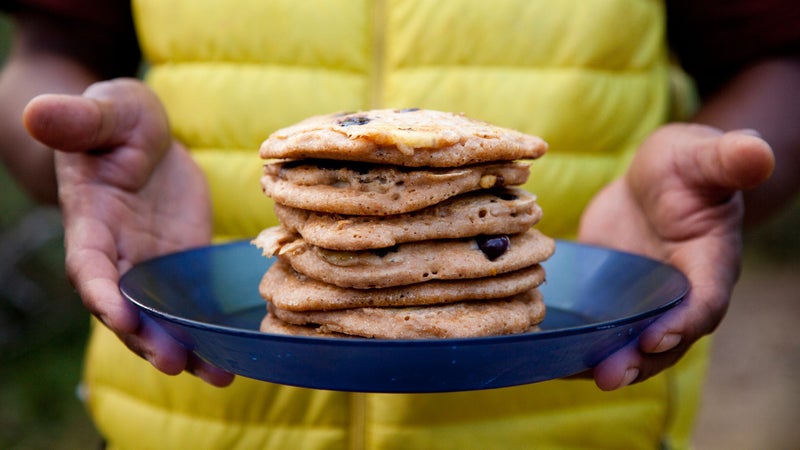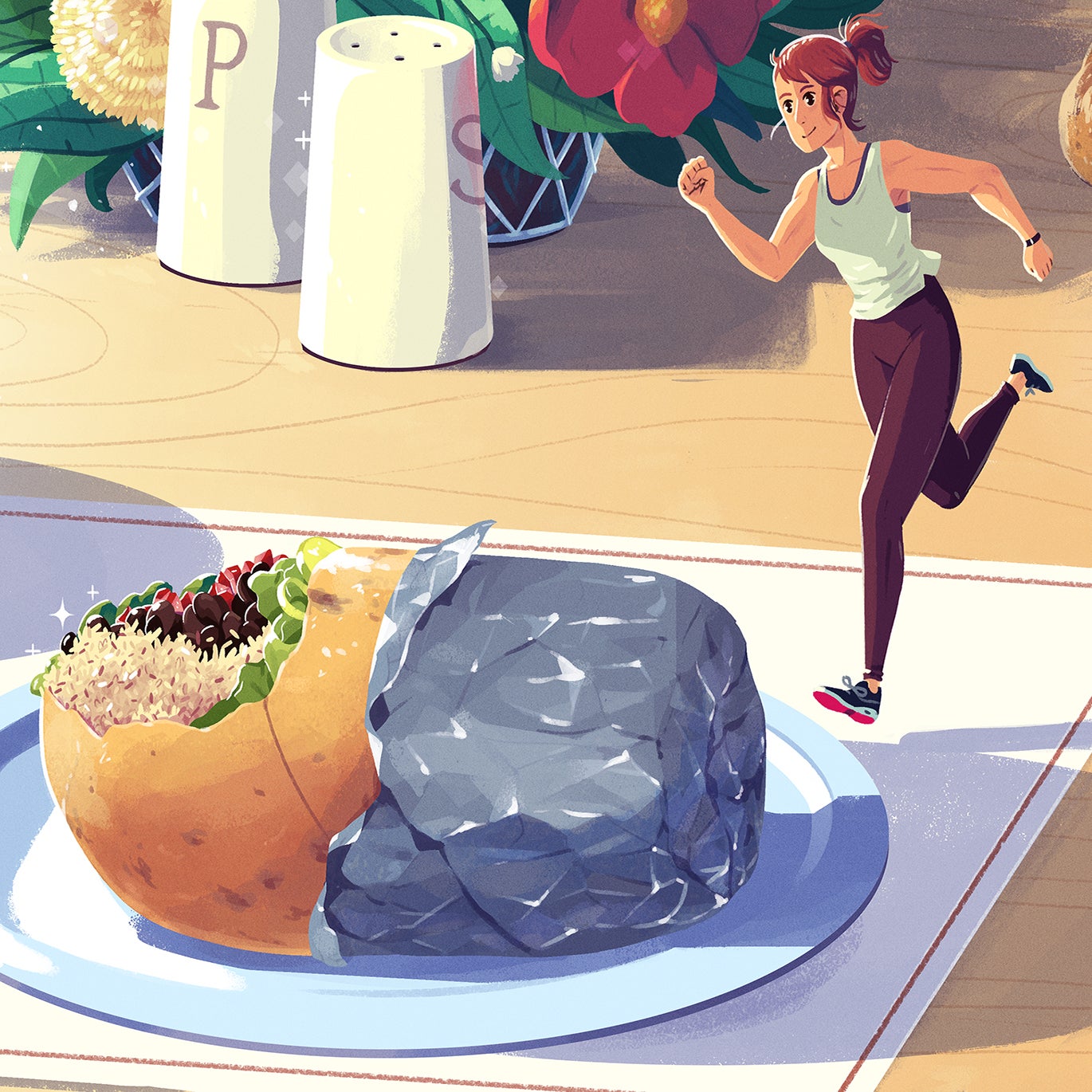Goldilocks may be just about the best metaphor for pre-run fueling. Eat too much, and your stomach revolts when you turn up the pace. Eat too little, and you stumble, weak from hunger, through your intervals.
Luckily, getting it ÔÇťjust rightÔÇŁ isnÔÇÖt a fairy tale. With a little know-how from top registered dietitians┬áand sports nutritionists, you can whittle your perfect pre-run snack from a shot block┬áin the dark to an exact science.
Of course, it takes a bit of experimentation to get your fueling on point. Pre-run nutrition is truly a ÔÇťyour┬ámileage┬ámay┬ávaryÔÇŁ scenario. ÔÇťIt also depends on the workout. WhatÔÇÖs the workout, and how far out are you consuming the meal?ÔÇŁ┬ásays Marni Sumbal, a board-certified sports dietitian, triathlon coach, and Ironman-distance triathlete. The harder your┬árun, the more careful you need to be. Figuring this out can take some time, but these suggestions should help guide you in the right direction.
Within an Hour of Running
In an ideal world, youÔÇÖd eat a balanced and nutritious snack two hours before running. But on days when everything goes sideways and your stomach grumbles as you slip into your running shorts, you need a quick hit of calories. ÔÇťLook for something low┬áfiber and low┬áfat,ÔÇŁ says Sumbal, because┬áfiber and fat can slow digestion. Even if youÔÇÖre absolutely starving, try to stick to a single serving of these foods since youÔÇÖre too close to your workout to safely handle a calorie bonanza.
Figs, Raisins, and Dates
Portable, full of fructoseÔÇöan easily┬áabsorbed sugarÔÇöand not too bulky, you can get a lot of quick calories from just a handful. Plus, unlike a gel or shot block, youÔÇÖll also get some micronutrients. ÔÇťRunners tend to gravitate toward┬áenergy bars and just look at the macronutrients in the nutrition facts. But that misses the big picture. Micronutrients are just as important,ÔÇŁ says Elyse Kopecky, a chef, nutritionist and co-author with Shalane Flanagan of the┬ácookbook┬á. Figs, dates, and raisins all contain flavonoid polyphenolic antioxidants, potassium, iron, magnesium, and calcium.
Applesauce or Juice
ÔÇőSumbal says small packs of applesauce or fruit juice can offer a quick, low-fiber source of fuel for short runs. Look for options without a ton of added sugar. One hundred percent fruit juice or no-sugar applesauce are┬ábest. If you choose something like pure tart cherry juice, it thanks to high levels of quercetin, a powerful antioxidant. Some athletes┬áfind that consuming juice or dried fruit alone causes a major blood sugar spike,┬ásymptoms of which could include feeling wobbly or woozy a few minutes after consumption. If this happens to you, try eating either of these options with a few almonds or a boiled egg white. ÔÇťThe added protein will slow down absorption,ÔÇŁ says Sumbal.
Rice Cakes, Nut Butter, and Honey
If youÔÇÖll┬ábe out for a longer run, youÔÇÖll need a bit of fat and protein to keep you from feeling hungry. Sumbal says a single rice cake with just a few teaspoons of nut butter and a drizzle of honey will give you both slow-burning fat and quick carbs. If rice cakes arenÔÇÖt your thing, Sumbal says bread is okay, but this is one of the few times when she actually recommends white over wheatÔÇöthe extra fiber in wheat could cause digestion mishaps.
Coffee!
Yes, for some runners, coffee will result in running straight to the nearest Porta-Potty. Definitely donÔÇÖt try pre-run coffee for the first time on race day. (However, coffee is a great way to make sure you, ahem, go before itÔÇÖs time to go.)┬áIf your stomach can handle it, Sumbal says thereÔÇÖs some evidence that caffeine taken within 45 minutes of running can decrease an athleteÔÇÖs rate of perceived exertion, so that 7:30 mile pace could feel┬ájust a touch easier. Three milligrams of caffeine┬áper kilogram of body weight is ideal. For an average adult-size┬áhuman, thatÔÇÖs a 3- to┬á4-ounce┬áespresso. If youÔÇÖre prone to issues with dairy, skip the cream.

If You Have 60 to 90 Minutes Before Your Run
This is that tricky area┬áwhere you have enough time to digest more than a handful of raisins┬ábut not enough for something like a whole burrito. Tommy Rodgers, a North CarolinaÔÇôbased coach and registered dietitian, says to aim for a mix of complex and simple carbs with just a touch of protein to keep you satiated and ensure digestion doesnÔÇÖt happen too quickly.
Superhero Muffins
These are one of Shalane FlanaganÔÇÖs secret weapons, says Kopecky. Essentially, itÔÇÖs a muffin made from almond flour, rolled oats, grated zucchini, and carrots, sweetened with maple syrup. The recipe,┬áposted on , has been a hit, according to Kopecky,┬áwho was an elite athlete at UNC Chapel Hill with Flanagan. Runners of all levels report slamming them before tough workouts and still performing. ÔÇťItÔÇÖs got a good mix of protein, carbs, and fat,ÔÇŁ she says, adding that the maple syrup is high in minerals like manganese and zinc.
Cereal and Almond Milk
Rodgers says that a┬ácereal without too much fiber paired with almond milk, flaxseeds, and a few raisins can make a perfect pre-run snack. He likes the brand NatureÔÇÖs Path, but eat whatever you like as long as it has a small amount of fiber and few added sugars. ÔÇťThis close to a run, I might not do dairy,ÔÇŁ Rodgers warns, but you know your gut better than anyone elseÔÇöif you can handle milk, by all means, enjoy some.
Oatmeal
On race morning, Flanagan almost always eats instant oats with mashed banana and chopped nuts thrown in. The banana provides potassium and fast-burning carbohydrates, while oats provide complex carbs for sustained performance. The nuts, which are full of healthy unsaturated fats, may even help with post-race recovery:  that nuts may reduce inflammation.
You Have 90 to 120 Minutes
If youÔÇÖre hungry or have a long, slow run coming up, you can safely ingest a fair number of calories and be totally comfortable while running. Aim to get something with a mix of simple and complex carbs, good fats, and a bit of protein, but ÔÇťnothing too hardy; we donÔÇÖt want anything thatÔÇÖs going to leave a lot of residue in the gut,ÔÇŁ says Sumbal, meaning anything super-fibrous or super-fatty is out.
Pita Sandwich 
You can stuff this with veggies and hummus or some sort of lean protein, say both Sumbal and Rodgers. Once again, white bread is okay,┬áeven if youÔÇÖd normally never touch the stuff. Sumbal says the trick is to think of pre-run foods purely as fuel, not a continuation of your daily diet. Whole-wheat bread, with its higher fiber count, can cause digestive issues, even two hours later.
Pancakes or Waffles
Before your Saturday morning long run, chow down on a couple pancakes with nut butter and honey. Rodgers also likes a waffle, cashew butter, and apple butter sandwich. Again, going with a white versus whole-wheat option is okay, and donÔÇÖt load up on just syrup.┬áYou need more than simple carbohydrates if youÔÇÖll┬ábe out for a few hours.
A Small Burrito
You might not want to do this before a group run, but if youÔÇÖre flying solo, feel free to stuff rice, beans, and veggies into a flour tortilla. Skip the cheese and sour cream, which Rodgers says will digest too slowly and make you feel sluggish, but feel free to add a mild salsa. The lycopene from the tomatoes is a powerful antioxidant, and thereÔÇÖs that lycopene supplementation could ease oxidative stress in runners.


